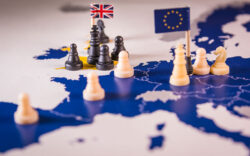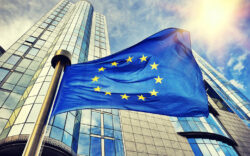The year was 1941. The world was at war.
“We must avoid frittering away our resources on untenable positions,” wrote Winston Churchill. He was talking about Hong Kong. Once a strategically important trading outpost of the Empire, now deemed too difficult to defend.
The Japanese invaded, without declaring war, and Hong Kong quickly fell. Four years of harrowing martial law followed, leaving the island starving, broken and destitute.
Where its pre-war population was over a million, by 1946 it was 600,000. Its per capita GDP was below $300, on par with much of Africa.
Yet in the span of little more than a generation, this tiny territory, with no significant natural resources to speak of, would become the world’s busiest port and an international manufacturing and financial powerhouse.
The question is, how?
None of it could have happened without the efforts of a quiet, determined and deeply principled Scot by the name of John James Cowperthwaite. He was part of a team of civil servants sent out in late 1945 to help get the colony back on its feet, and would eventually become the colony’s financial secretary.
The governor announced that Hong Kong was a free port. There would be no tariffs on any goods bar a few commodities, no export subsidies and few import restrictions. Imports and exports resumed and it soon became apparent to Cowperthwaite, an observant man who would walk the streets and visit the factories and ports to keep an eye on activity, that business was picking up by itself. The more he watched, the more progress he observed – all without the civil service having to do anything.
Hong Kong did not need an economic plan, he decided. Steeped as he was in Adam Smith (it is said he slept with a copy of The Wealth of Nations by his bed), this was an observation Cowperthwaite, a classical liberal if ever there was one, was glad to make.
Positive non-intervention
Cowperthwaite’s second task was to manage the department responsible for getting essential supplies to the island – buying, selling and distributing food and fuel, and administering price controls. The department was beset with problems. “When government gets into a business,” he concluded, “it tends to make it uneconomic for anyone else.”
He was beginning to formulate a theory he would later call “positive non-intervention”. The default position should be not to intervene, unless careful consideration gives good reason to do so. “Clumsy bureaucratic fingers” should be kept out of the “sensitive mechanism” of the economy, he said.
Hong Kong’s tax policies were the polar opposite of those pursued by Britain over the same period. Where Britain – and most of the West – had high levels of taxation, government spending, deficit financing, industrial planning and economic intervention, Hong Kong went the other way.
Most people paid no income tax at all. Even higher earners only paid 15%. There were no tariffs or duties, no sales taxes or VAT, no taxes on capital gains, on interest or on overseas earnings. There was a land value tax, but the overall tax burden never exceeded 14% of GDP.
Red tape was reduced to the point that a new company could be registered with just a one-page form. The tax code itself was kept short and simple. Even today, international tax lawyers regularly deem it the world’s most efficient. At 300 pages and fewer than 150,000 words, it is 1.5% the size of the UK’s.
Nor were there any capital controls. “Money comes here and stays here because it can go if it wants to,” Cowperthwaite said.
Hong Kong was no transparent democracy. It was a British colony. The governor, advised by the Legislative Council, had wide powers to make and enforce laws. In the wrong hands, the system could have been easily corrupted.
Cowperthwaite was only able to do what he did because of the unique circumstances in which Hong Kong found itself: in need of rebuilding, located far away from societies where Keynesian ideology had taken hold of government policy, not answerable to anyone. “Keynes was not writing with our situation in mind,” he said.
An unmeasurable boom
The economic consequences of their differing tax policies would be dramatic for both Britain and Hong Kong. Although it is hard to put numbers on just how successful Hong Kong was. Deliberately so. Because another of Cowperthwaite’s policies was to avoid compiling statistics.
He believed such figures led officials to start fiddling in the economy, remedying perceived ills that didn’t need remedying and thus hindering the work of the invisible hand in the market. Later in life he was asked what poor countries should do to turn their economies around. The first thing he said was “abolish the office of national statistics”.
The many refugees fleeing civil war in mainland China in the 1950s meant that Hong Kong remained little more than a shanty town. Today, Hong Kong is a futuristic city state.
By 1960, Hong Kong’s GDP per capita was $429 (according to the OECD, not Cowperthwaite), compared to $1,380 for the UK and $3,007 for the US. Within 33 years its GDP per capita exceeded that of the UK. Within 50 years it overtook the US. Today it ranks among the ten richest nations in the world. Its per capita GDP is 40% higher than the UK’s.
In all this time, taxes were kept low and government spending to a minimum. The government ran a budget surplus every year after 1946 bar one, usually keeping a year’s worth of spending in reserve and never creating any national debt. “I am sceptical of the theory that we have a right, if we could, to pass on our capital burden to future generations… Our predecessors had not passed any significant part of their burden on to us.”
Every year since 1995, the Washington DC economic think tank, the Heritage Foundation, has compiled a detailed index of economic freedom for 186 countries around the world. It defines economic freedom as the amount of control people have over their own labour and property. And it has 12 quantitative and qualitative factors by which it measures that freedom. Every year Hong Kong has ranked first – the most economically free nation on earth.
On the supply side, it is not as though Hong Kong’s services lack in any way. The territory has the fourth best education system in the world, according to Pearson. And it ranks top of Bloomberg’s healthcare index. Its public transport was ranked the world’s best last year, and it is consistently used as a model elsewhere, regularly achieving a 99.9% “on-time success rate”, with 94% of the population living within one kilometre of a railway station. It is also one of the world’s most profitable systems.
Laissez-faire economies tend to be painted as ruthless and heartless. But Cowperthwaite was adamant that his policies were for the good of all. Tax was an imposition, an obstacle to growth. Lower taxes meant greater profits. Greater profits meant more growth. More growth meant more jobs, better-paid jobs and greater wealth for all.
But here was a key point for Cowperthwaite: “It also makes it possible to assist more generously those who are not, from misfortune temporary or permanent, sharing in the general advance.” The interests of those at the very bottom were close to Cowperthwaite’s heart, and a booming economy put the government in the best possible position to help them.
Crashproof without government
Hong Kong dealt with every challenge thrown at it, but with almost every crisis – public housing aside – the default position of the government was not intervention, but positive non-intervention.
In 1950, Hong Kong’s main industries sprung from its role getting goods in and out of China – warehousing, shipping, shipbuilding, insurance and so on. When the Korean War began, and the US imposed sanctions, the colony’s trade with China collapsed by around 90%. Hong Kong should have ground to a halt. But it didn’t.
Immigrants fleeing civil war in China brought their cotton spinning skills with them, and the colony would grow to dominate international textile markets instead. To the extent that the UK and the US both resorted to dramatic protectionist measures to support their domestic textile industries.
Hong Kong businesses adapted to the strict import quotas on Hong Kong cotton by growing their synthetic textile output instead. They diversified into other forms of manufacturing – especially electronics and plastics. In 1967, the devaluation of the pound meant a loss of some £30 million to Hong Kong’s foreign exchange reserves. But the colony took that in its stride too, as it did the destabilising impact of Mao’s cultural revolution in China and the Asian crisis of 1997.
Not just a flash in the pan
When Hong Kong was handed back to China in 1998, the expectation was that it and its policies would effectively be annexed. In fact, the opposite happened. The rest of Asia had noticed Hong Kong’s success and they were copying it.
Soon after Lee Kuan Yew became the first prime minister of Singapore, in 1959, he adopted the colony’s low-tax, non-interventionist model, with similarly successful results. South Korea and Taiwan, even Japan to an extent, all had their own adaptations of low-tax, high-export models and all enjoyed huge periods of economic growth of their own. China itself would do something similar.
After Chairman Mao’s death in 1976, reformers in China, who had observed the extraordinary growth of Hong Kong and Singapore, thought Cowperthwaite’s model could work on the mainland too. In 1980, Shenzhen was chosen to be a special economic zone – light on taxes and regulation. The population then was 30,000. It has grown to nearly 13 million, as more and more people have gone there seeking their fortune. At one stage its growth rate was an astonishing 40%. Today it is another Hong Kong.
China wanted to “appropriate capitalism for the good of socialism”, as the National People’s Congress put it in their legislation. “We didn’t pay enough attention to developing the productive forces,” said Deng Xiaoping in his famous 1984 speech, ‘Socialism with Chinese Characteristics’.
Given what these tiny islands had achieved, what was China capable of? Today, China, with its own brand of authoritarian capitalism, is the second largest economy in the world, in purchasing power parity terms perhaps the biggest.
There is no doubt that Hong Kong was an extraordinary situation in an extraordinary time. But its low taxes and positive non-intervention are where the Asian economic miracle began. Cowperthwaite’s achievement lay not so much in what he did do, but in what he didn’t. “I did very little,” he said with typical humility. “All I did was to try to prevent some of the things that might undo it.”
Dominic Frisby
Daylight Robbery – How Tax Shaped The Past And Will Change The Future is available at Amazon and all good bookstores with the audiobook, read by Dominic, on Audible and elsewhere.




